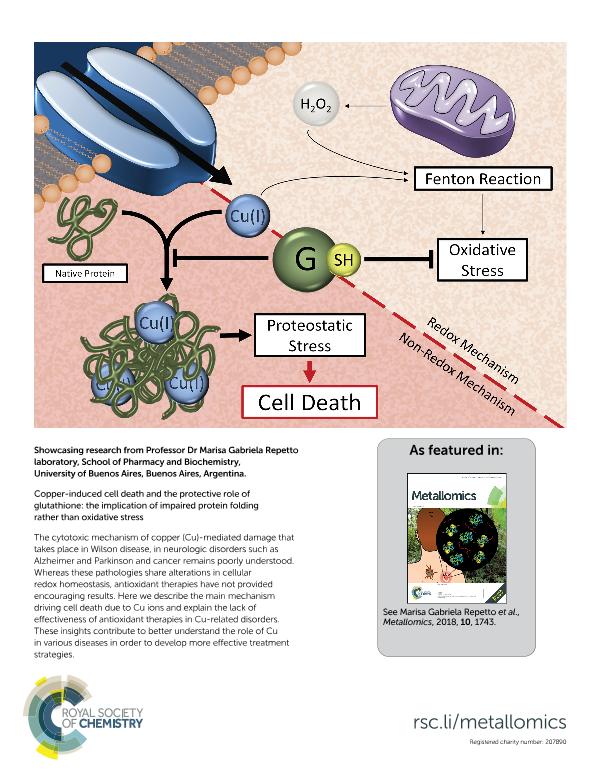Artículo
Copper-induced cell death and the protective role of glutathione: The implication of impaired protein folding rather than oxidative stress
Saporito Magriñá, Christian Martín ; Musacco Sebio, Rosario Natalia
; Musacco Sebio, Rosario Natalia ; Andrieux, Geoffroy; Kook, Lucas; Orrego, Manuel Tomás; Tuttolomondo, María Victoria
; Andrieux, Geoffroy; Kook, Lucas; Orrego, Manuel Tomás; Tuttolomondo, María Victoria ; Desimone, Martín Federico
; Desimone, Martín Federico ; Boerries, Melanie; Borner, Christoph; Repetto, Marisa Gabriela
; Boerries, Melanie; Borner, Christoph; Repetto, Marisa Gabriela
 ; Musacco Sebio, Rosario Natalia
; Musacco Sebio, Rosario Natalia ; Andrieux, Geoffroy; Kook, Lucas; Orrego, Manuel Tomás; Tuttolomondo, María Victoria
; Andrieux, Geoffroy; Kook, Lucas; Orrego, Manuel Tomás; Tuttolomondo, María Victoria ; Desimone, Martín Federico
; Desimone, Martín Federico ; Boerries, Melanie; Borner, Christoph; Repetto, Marisa Gabriela
; Boerries, Melanie; Borner, Christoph; Repetto, Marisa Gabriela
Fecha de publicación:
03/12/2018
Editorial:
Royal Society of Chemistry
Revista:
Metallomics
ISSN:
1756-5901
Idioma:
Inglés
Tipo de recurso:
Artículo publicado
Clasificación temática:
Resumen
Copper (Cu) is a bioelement essential for a myriad of enzymatic reactions, which when present in high concentration leads to cytotoxicity. Whereas Cu toxicity is usually assumed to originate from the metal's ability to enhance lipid peroxidation, the role of oxidative stress has remained uncertain since no antioxidant therapy has ever been effective. Here we show that Cu overload induces cell death independently of the metal's ability to oxidize the intracellular milieu. In fact, cells neither lose control of their thiol homeostasis until briefly before the onset of cell death, nor trigger a consistent antioxidant response. As expected, glutathione (GSH) protects the cell from Cu-mediated cytotoxicity but, surprisingly, fully independent of its reactive thiol. Moreover, the oxidation state of extracellular Cu is irrelevant as cells accumulate the metal as cuprous ions. We provide evidence that cell death is driven by the interaction of cuprous ions with proteins which impairs protein folding and promotes aggregation. Consequently, cells mostly react to Cu by mounting a heat shock response and trying to restore protein homeostasis. The protective role of GSH is based on the binding of cuprous ions, thus preventing the metal interaction with proteins. Due to the high intracellular content of GSH, it is depleted near the Cu entry site, and hence Cu can interact with proteins and cause aggregation and cytotoxicity immediately below the plasma membrane.
Palabras clave:
COPPER
,
OXIDATIVE STRESS
,
ANTIOXIDANT
Archivos asociados
Licencia
Identificadores
Colecciones
Articulos(IQUIMEFA)
Articulos de INST.QUIMICA Y METABOLISMO DEL FARMACO (I)
Articulos de INST.QUIMICA Y METABOLISMO DEL FARMACO (I)
Citación
Saporito Magriñá, Christian Martín; Musacco Sebio, Rosario Natalia; Andrieux, Geoffroy; Kook, Lucas; Orrego, Manuel Tomás; et al.; Copper-induced cell death and the protective role of glutathione: The implication of impaired protein folding rather than oxidative stress; Royal Society of Chemistry; Metallomics; 10; 12; 3-12-2018; 1743-1754
Compartir
Altmétricas



